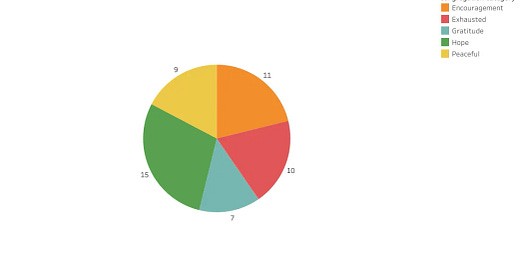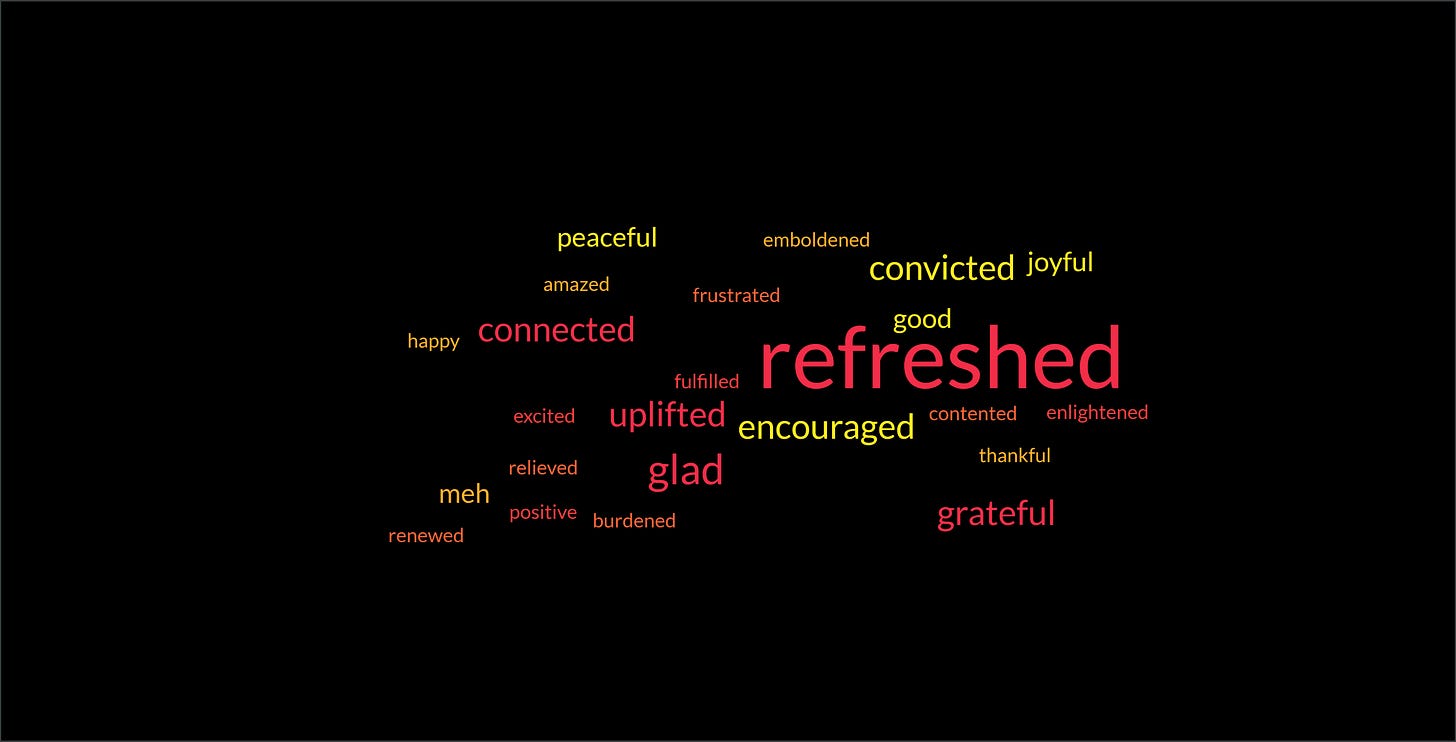I thought worship leaders were wrong about their congregation...
But I was wrong and that's a good thing!
When I read through the responses from the congregants to my survey, I thought that the worship leaders got it all wrong. I remembered the worship leaders being a little pessimistic about how the congregants felt after worship services. I remember leaders stating that they thought people were in church due to obligation and that the congregation was happy when it got over. Another comment I remembered popping up a couple times was that the congregation was not changed by the worship, that they left feeling the same as when they entered and no transformation or formation had occurred.
I also had the thought that most of the worship leaders did not know how their congregation felt after worship. The worship leaders I interviewed were hesitant about implementing any forms of formal feedback like surveys or even a comment box because they were sure that they would just get complaints about the tempo of the songs, that the songs were out of their vocal range, or they want more or less hymns. One leader said, “I’m still trying to wrap my brain around a system for feedback that isn’t a form and is instead, perhaps, an ongoing conversation of some sort.” And I am too. How do we get the congregation and the leaders talking? Especially if they are on different pages about how worship is perceived at their church.
Here’s Where I am Wrong:
Back in December, I wrote about what worship leaders thought their congregations felt after worship. Almost half of the respondents answered that their congregations felt Hopeful, thankful, or encouraged after the service. When you add an interpretive lens to better categorize the responses together, 9 say peaceful, 11 leaders say that their congregations feel encouraged, and 15 say hopeful. Conversely, ten respondents indicated that they believe their congregations feel tired after the services. Another significant comment is that some members express feeling “glad the obligation is fulfilled,” or, in the case of extended services, they are relieved when it concludes. Some people see church as something that they have to do or are supposed to do, and there is nothing that worship services can do to change their mood.
Here’s the pie graph that illustrates the worship leaders responses:
Here’s the longer version:
Most of the worship leaders thought that their congregation was walking away feeling hopeful, thankful, and encouraged. Only one leader thought that their congregation was unfulfilled or ready to go home for a nap. If you look closely, there are only 4 responses that are not some sort of “positive” feeling towards the service. I thought that the worship leaders were being a little hard on themselves and the congregation, but looking back at the data, I was wrong. It is important when thinking or writing about a topic to keep the data in mind, so that you do not have to admit that you are wrong.
Wow, was I wrong
It’s even better if you do not have to admit being wrong for a second time in the same post. I am glad that only my research assistant heard me being wrong, but I think it’s good to model corrective thinking. I thought that there would be more “negative” feedback about worship present in the congregant survey. And it was heart-warming to see the data come in and tell me that I was wrong.
35 out of 42 congregants responded that they are walking out of church with “positive” emotions while the others are neutral or negative. Adding age into the chart does not bring a lot out, but we made the chart so you get to see it:
Sometimes, it is difficult to figure out how to encode and interpret responses. For example, a 25-34 male Anglican replies that how he feels after church “Depends on the day and how wrangling my toddler went.” If the toddler acted inside of the acceptable norms, would the parent have a “positive” feeling walking away? Or would it still be “negative” or even “neutral”? Another parent wrote essentially the same comment, saying it “often depends on how my kids are behaving to be frank.” At least that parent gives us some closure by adding on that they leave often feeling filled. Reading their other responses, it is difficult to tell.
Here’s a word cloud of the responses where we can see that the top result is something akin to refreshed, but that is with a lot of interpretation done by me and my research assistant:
The same issue of deciphering results comes from responses that contrast feeling good and convicted. A 35-44 year old Non-Denominational male writes, “I enjoy church and worship and I do generally feel good after leaving. I also feel convicted in the times when the service or music hit that tone or the Holy Spirit moves in that way.” Is convicted a “positive” or a “negative” emotion? Inside of Christianity, it would make sense to read conviction as a something that should be happening (hence “positive”), while also sounding “negative” because it is a feeling of discomfort and discontent with the way that one is thinking and acting. One respondent writes that worship is part of Christian growth and development, meaning that they would most likely see conviction as a “positive.”
The response that provided the least amount of figuring was from a 35-44 year old Anglican who responded, “meh, usually.” That makes sense, especially in light of their other comments. They wrote in responses to other questions about the disconnect between their emotional life and the emotions presented in church while also expressing commitment to the church. I think that if our congregations were honest, we’d have a lot of people resonating with the “meh.” It’s not quite the answer that they come away from the service angry or gross, “Like I need a shower" as a 45-54 year old Non-Denominational respondent wrote. It’s not that they feel cynical like 25-34 year old Reformed respondent wrote. It was just fine. It wasn’t life changing or transforming, and that’s okay. Not everything has to be always amazing and blowing our minds all the time.
What I Learned:
Besides the fact that I was wrong, and have a bad memory, I learned that I am on the right path. Returning to the worship leader’s comment above, that they are “still trying to wrap my brain around a system for feedback that isn’t a form and is instead, perhaps, an ongoing conversation of some sort,” I think they are correct. The only way to understand your congregant is to engage with them in conversation. It’s one simple step! Just talk to people at church! In fact, you might not even have to talk to them, you can just watch their body language as they leave or linger.
I feel like the church tries to program things to death and making a survey or holding special focus groups might fall into such a problem. But I understand that if you have a congregation of 3-4 thousand members, you cannot talk to them all. But your worship band and tech team can help you talk to more people. Plus the people that really wanted to be talked to will probably come to you. What I am trying to say is that the church is relational and the only way you will know what people want and need, like and dislike, is by talking to them and being in their lives.
You do not even have to discuss worship with them! By sharing life together, you will get to know each other and from their you will learn about what is missing or over-emphasized in the worship services. And if they want to talk about worship, maybe invite them into the process a little. Ask them what they would change if they bring it up, but mainly be around the congregation.
I asked a few worship leaders why they felt like they were not getting feedback after the service and they said that it is either because they are too busy playing something while everyone is leaving or too occupied with packing up their gear to seem approachable. I know “Be Approachable, Be Available, and Be Part of the Community” is more than one step, and a little cheesy, but I think it’s how we get to understand what the church needs. If we understand the people, we understand the church.
Unless I am wrong again. Have you already solved the feedback issue? If so, let me know why I am wrong!









First, it is good that a person would say that they were wrong publicly.
Second, "I know “Be Approachable, Be Available, and Be Part of the Community” is more than one step, and a little cheesy, but I think it’s how we get to understand what the church needs. If we understand the people, we understand the church." I think what I was never asked either in a questionaire or personally by the music committee or whatever they are called in your church. I have gone to a musician to ask the name of a song or how well play a piece was play.